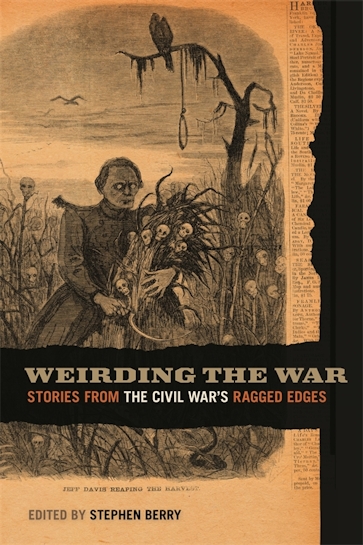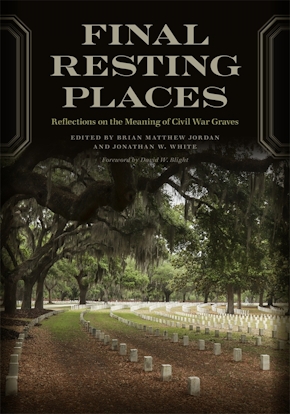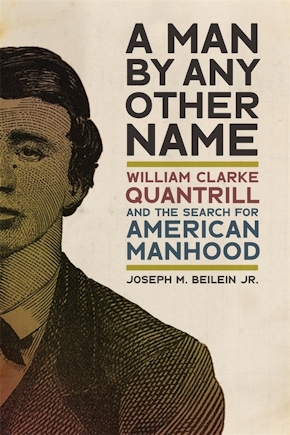Weirding the War
Stories from the Civil War's Ragged Edges
Title Details
Pages: 352
Trim size: 6.000in x 9.000in
Formats
Paperback
Pub Date: 10/01/2011
ISBN: 9-780-8203-4127-9
List Price: $34.95
Hardcover
Pub Date: 10/01/2011
ISBN: 9-780-8203-3413-4
List Price: $120.95
Series
Related Subjects
HISTORY / United States / Civil War Period (1850-1877)
Weirding the War
Stories from the Civil War's Ragged Edges
Skip to
- Description
- Reviews
- Contributors
“It is well that war is so terrible,” Robert E. Lee reportedly said, “or we would grow too fond of it.” The essays collected here make the case that we have grown too fond of it, and therefore we must make the war terrible again. Taking a “freakonomics” approach to Civil War studies, each contributor uses a seemingly unusual story, incident, or phenomenon to cast new light on the nature of the war itself. Collectively the essays remind us that war is always about damage, even at its most heroic and even when certain people and things deserve to be damaged.
Here then is not only the grandness of the Civil War but its more than occasional littleness. Here are those who profited by the war and those who lost by it—and not just those who lost all save their honor, but those who lost their honor too. Here are the cowards, the coxcombs, the belles, the deserters, and the scavengers who hung back and so survived, even thrived. Here are dark topics like torture, hunger, and amputation. Here, in short, is war.
Weirding the War is an eclectic mix of absorbing essays on the American Civil War. It shatters conventional paradigms, asking new questions and offering fresh insights into a war that continues to fascinate, even obsess, both academic and popular audiences.
—Victoria Bynum, author of The Long Shadow of the Civil War: Southern Dissent and Its Legacies
Saying something truly new about the American Civil War seems impossible, but here is a book that offers an explosion of new perspectives and insights, often surprising and sometimes disturbing. Read this book and you will never be able to imagine again whatever Civil War you imagined before.
—Edward L. Ayers, winner of the Bancroft Prize for In the Presence of Mine Enemies: The Civil War in the Heart of America, 1859–1863
Emphasizing selfishness and its victims, not sacrifice, the authors provide insights into the war's cultural and social history by looking at persons on the margins, oftentimes considered 'weird' by society's mainstream. . . . Weirding the War matters not because its characters exhibited oddities or peculiarities, but rather because of their intensely human, commonplace experiences, strengths and weaknesses. Their mundane stories remind us of the 'weirdness' of war generally and the connection between individuals in the past and ourselves.
—John David Smith, News & Observer
Berry and his contributors manage to accomplish their goal and weird the Civil War. . . . Ironically, it is by breaking Civil War history from the limitations of the Civil War narrative that we can introduce twenty-first-century Americans to their counterparts in the nineteenth century—weird.
—Barbara A. Gannon, Journal of American History
Weirding the War proves that there are still many questions left to be asked and answered about this popular time in American history. These essays collected by Dr. Stephen Berry expand the boundaries of what historians have looked at, and bring new ideas to the forefront of current Civil War thinking.
—Kristopher Allen, Southern Historian
[Berry’s] manifesto-like introduction calls for new questions, new themes, and new topics that turn upside down what we think we know about the [Civil War]. . . . The animating force behind these essays, and the books that will follow, is to nudge students, buffs, and popular audiences to replace the Civil War’s inspirational story with the darker version.
—Joan Waugh, Journal of Southern History
Overall, whether in soldier, civilian, or veteran studies, the future direction of the new military history emanates from Weirding the War.
—Matthew E. Stanley, Register of the Kentucky Historical Society
Anya Jabour
Barton A. Myers
Brian Craig Miller
Daniel E. Sutherland
Diane Sommerville
Emory Thomas
Joan E. Cashin
Kenneth Noe
LeeAnn Whites
Lesley J. Gordon
Megan Kate Nelson
Michael DeGruccio
Michael Fellman
Paul Anderson
Peter S. Carmichael
Rodney J. Steward
Steven E. Nash
Stephen Berry
Andrew Slap
Amy Murrell Taylor



